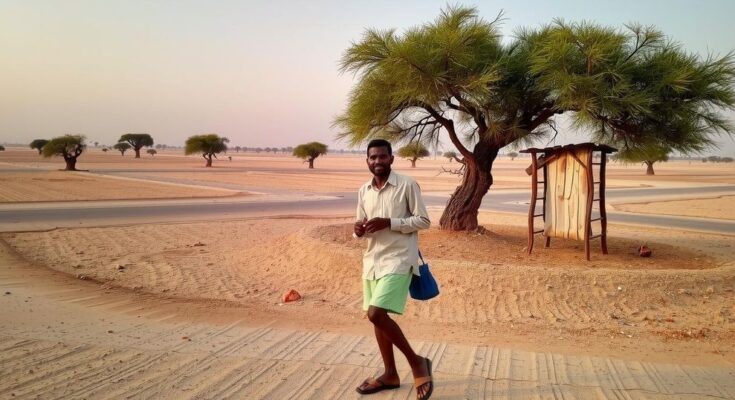The Sahel region faces increasing climate challenges due to torrential rains and subsequent flooding, disrupting livelihoods and displacing millions. Military coups in countries like Burkina Faso, Mali, and Niger have interrupted climate adaptation projects and limited access to international funding. Organizations such as the OSS promote community-focused strategies for resilience, while political instability continues to hinder meaningful progress toward effective climate policies.
Torrential rains during the Sahel’s rainy season have led to extensive flooding across nations including Burkina Faso, Chad, Mali, Niger, Nigeria, and Sudan, displacing millions and submerging large areas of agricultural land. Concurrently, military upheavals in Burkina Faso, Mali, and Niger have interrupted governance and climate resilience initiatives, while political alienation from Western nations hampers access to vital international climate funding, leaving communities vulnerable to the consequences of extreme weather.
Organizations such as the Sahara and Sahel Observatory (OSS) emphasize the necessity of empowering local communities through strategies like Water User Associations and agroecology, which focus on sustainable management of land and water resources by utilizing local expertise. Despite its potential for renewable energy and sustainable agricultural practices, the Sahel faces significant challenges due to political instability, ineffective governance, and financial resource deficits that hinder progress toward climate resilience.
The Sahel’s increasing vulnerability to climate change is highlighted by scenes of devastation following heavy rainfall this past season, where swelling rivers inundated villages and displaced families. Satellite imagery shows extensive farmland lost to flooding, while across West and Central Africa, nearly 7 million individuals suffer due to these climatic disruptions. As quantified by Housséini Ouedraogo from Mercy Corps, the proliferation of contaminated water poses significant health risks in affected areas.
The political environment has exacerbated these challenges, as military-led governments in Niger, Mali, and Burkina Faso have cultivated political isolation from the West, hindering climate adaptation efforts. While international donors have become cautious in funding these governments, organizations like the OSS are working to help Sahelian nations access climate finance and implement community-driven adaptation strategies.
In contrast, Chad and Mauritania have established more cohesive climate policies amidst their military influence, prioritizing sustainable agricultural practices and water management. However, these policies often stem from immediate security concerns, rather than long-term ecological sustainability. The geopolitical complications, involving sanctions by Western nations, render it difficult for junta-led governments to secure the funding necessary for extensive climate initiatives.
The OSS plays a pivotal role in supporting local adaptation by advocating for community-led approaches, which are crucial in rural settings where traditional knowledge is essential for effective resilience strategies. Community management of shared resources, such as through Water User Associations, exemplifies such collaborative efforts.
Moving forward, regional organizations must be bolstered by robust political frameworks that encourage accountability and resource management, while international players like NGOs and development agencies should focus on supporting local initiatives that enhance climate resilience amidst existing political challenges.
Despite the hurdles posed by political instability, experts underscore the necessity for unified regional initiatives to tackle climate change collectively, as the impacts transcend national and political boundaries. By fostering a collaborative environment, the Sahel can address both immediate needs and long-term adaptation strategies, laying the groundwork for a more resilient future against climate adversities.
The Sahel region, situated south of the Sahara Desert, has long experienced extreme weather conditions, and recent changes in rainfall patterns have significantly heightened its climate vulnerability. Consequently, countries in the Sahel have faced challenges such as prolonged droughts, desertification, and flooding. Political instability, particularly resulting from military coups in Burkina Faso, Mali, and Niger, has compounded these climate challenges by disrupting governance and diminishing access to necessary international support and financial resources for climate adaptation. In contrast, countries with relatively stable governments like Chad and Mauritania manage to advance more coherent climate policies despite similar threats, demonstrating the critical role of governance in effective climate action.
In closing, the Sahel’s complex interplay of climate vulnerability and political instability necessitates an integrated approach to climate adaptation and governance reforms. By focusing on community-led strategies, fostering regional cooperation, and improving governance frameworks, the Sahel can begin addressing the immediate impacts of climate change while laying the groundwork for sustainable resilience against future challenges. Collaborative efforts that unite nations and communities are imperative, as climate change necessitates collective responses that transcend political borders.
Original Source: news.mongabay.com




